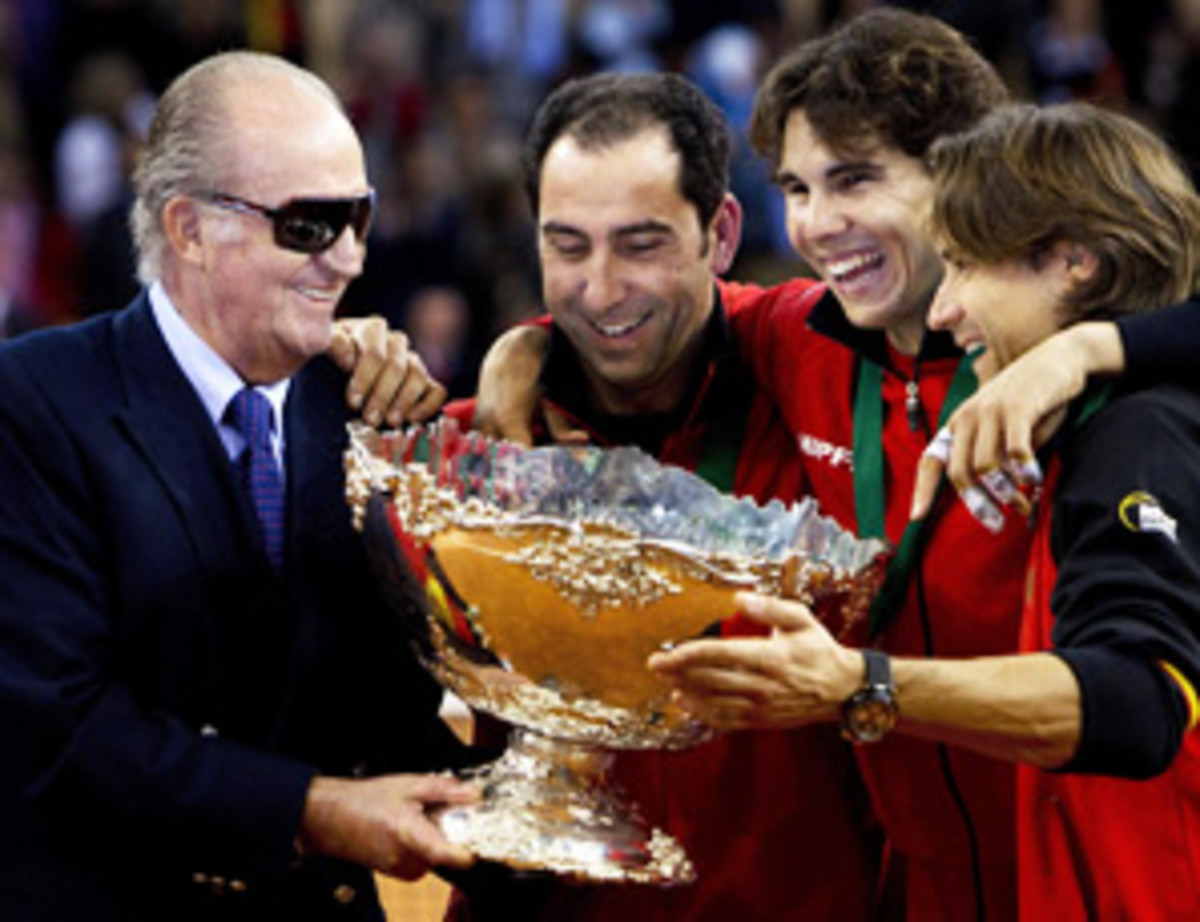
Changes needed for Davis Cup format, but not at cost of passion
Condense the schedule a bit? Absolutely. Place it into greater focus, so it's not an end-of-the-year afterthought? Definitely. Remove the passion, though, and you've lost the essence.
U.S. captain Jim Courier made a lot of sense with his recent suggestion that Davis Cup should be "condensed into a two-week format, at least for the big boys. It should be combined with the Fed Cup, so it becomes in effect the fifth Grand Slam." Any time there's a suggestion that tightens up the tennis calendar, it's worth a long look -- especially as it regards Davis Cup, with a format and calendar so baffling, few fans have any idea what's really taking place.
WERTHEIM: Spain a tennis powerhouse
The problem with a two-week showcase is that it requires a neutral site, or a venue specified too far ahead of time to guarantee sufficient partisanship, and that's where the idea falls apart. As Rafael Nadal and David Ferrer led Spain to the title in Seville, the crowd reaction was as loud, passionate and inspiring as anything I can recall in tennis. Only the Goran Ivanisevic-Patrick Rafter Wimbledon final -- that "People's Monday" before a blue-collar crowd in 2001 -- can compare, but I actually attended that one. The back-and-forth desire in Seville came ripping right through the television set and into the living room.
It was the presence of several thousand Argentine fans, clad in the traditional blue and white, that really made the difference. Once the Spanish crowd realized how much support was coming for the opposition, the emotional stakes got higher. At the really crucial stages, people broke into song after every point. The chair umpire tactfully allowed for several moments of bedlam before demanding silence. Even the hint of vulnerability -- say, Juan Martin del Potro's netting a first serve -- brought joyous hoots of derision. Tennis Channel was just along for the ride (such a shame to see Brett Haber and Justin Gimelstob calling the action from a stateside studio), but the international TV feed was masterfully orchestrated, ably capturing the radical swings of emotion in the stands.
NGUYEN: Nadal shows good sportsmanship
Something has to be done about the Davis Cup schedule, if for no reason than to bring it into the public eye. (Monday's San Francisco Chronicle had a 12-page sports section, and Spain's victory was at the bottom of page 12, two paragraphs' worth, buried deep in a "Digest.") I've recommended shutting down the Tour after the U.S. Open and devoting at least a month, perhaps longer, to a 16-country Davis Cup competition with home-court flavor. Nobody's hearing of that, obviously. The Tour is irrevocably locked into too many tournaments around the world, and it is just such a commitment that has globalized the sport to such an enviable degree. Whatever happens, remember what it means -- and how it feels -- for the likes of Nadal, Novak Djokovic and Andy Roddick to play Davis Cup tennis on home ground. It's one of the game's true treasures.
• Nadal was something of a broken man as the event began, coming off such an unsatisfying (by his standards) year, but his resurrection on clay was something to behold. "You're left wondering, when can you win a point off this kid?" marveled Argentina's Juan Monaco, routed by Nadal in the opening match. Most everyone was rendered awestruck, leaving Nadal to say, "A week ago I was finished, and now I don't seem human."
• Davis Cup brought out the best in Ferrer this year, and it's difficult to say which victory was more impressive: the titanic battle against Del Potro -- featuring some of the most stunning defensive play by anyone on tour this year -- or his grind-it-out triumph over Roddick in Austin, Texas. Ferrer has risen to No. 5 in the world, and such status is richly deserved.
• Looking forward to 2012, the most relevant question might regard Del Potro's chances to rejoin the elite. So often he was brilliant over the weekend, fearlessly hammering wicked forehand winners under pressure. But there were several instances -- particularly some costly double-faults -- in which he seemed gripped by anxiety. It was heartbreaking, for certain, to watch him leave the court twice in tears. Argentina's Davis Cup drought has become a lively and very uncomfortable topic back home.
• At one point, a highly impressed Del Potro proclaimed, "Spain on brick dust (is) perhaps the best team in history." If Fernando Verdasco and Feliciano Lopez could ever get locked into top doubles form, that would truly enrich the argument. I'd put in a claim for the 1992 U.S. team featuring Courier, Andre Agassi, Pete Sampras and John McEnroe. I'm also partial to the great Australian teams of the past, particularly the mid-'50s (Lew Hoad, Ken Rosewall) and early '60s (Rod Laver, Roy Emerson, Neale Fraser).




